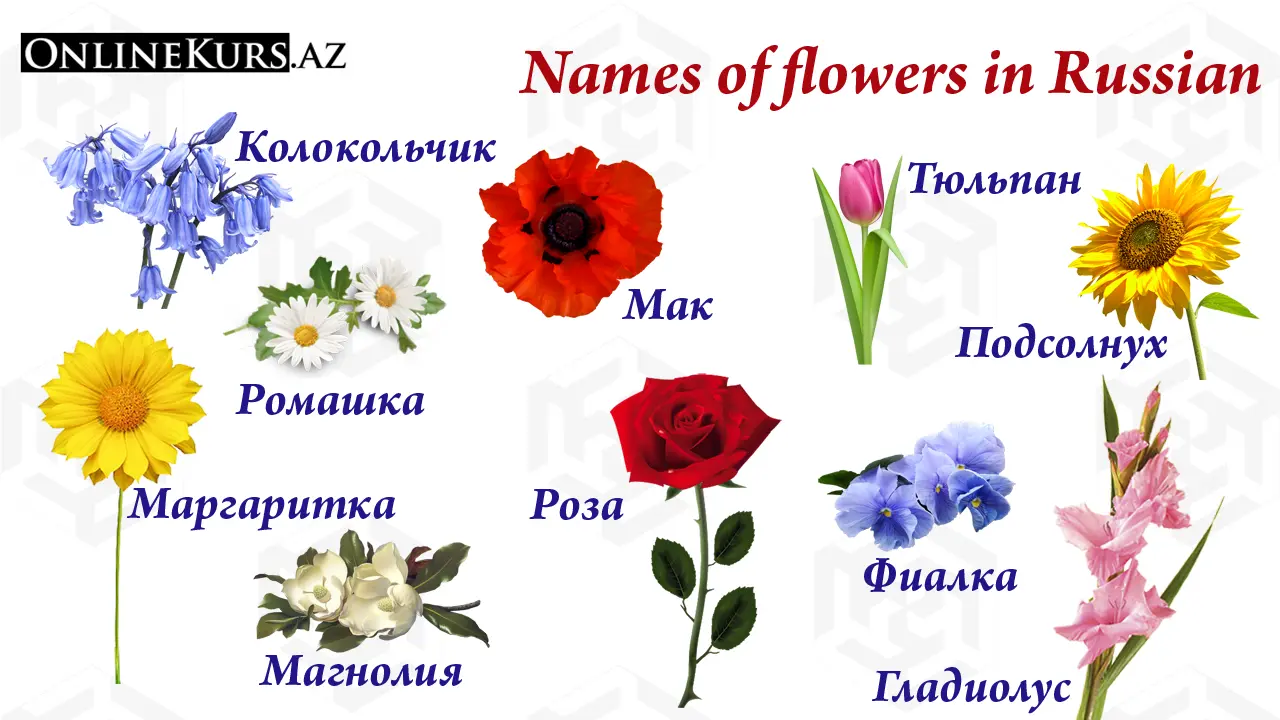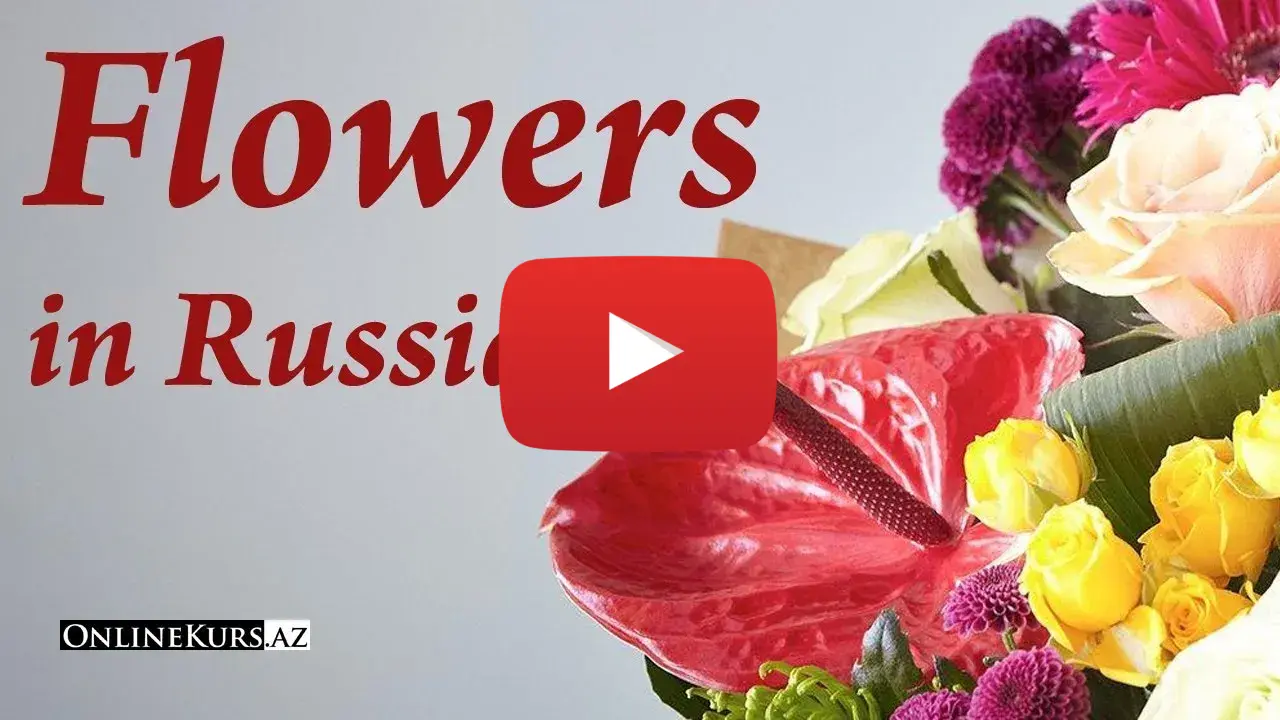Flowers in Russian
If you think that the topic of Names of flowers in Russian is purely feminine, we will convince you. After all, it is especially man's job to make women happy. Women, on the other hand, like to receive flowers and it makes them happy. Therefore, we boys need to learn the Russian flower names. To remember the correct pronunciation of flowers in Russian, open the video and repeat after the announcer.
We give flowers to each other almost every holiday. It is a peculiar way of expressing any feeling about a person. There is also a certain science - floriculture, which is engaged in growing various flowers and creating various compositions from them. Gardening is also very popular in Russia. Almost every private house has its own small garden, many of which grow not only flowers, but also many other plants. Of course, if your interlocutor is Russian, then you can safely support the conversation by opening the topic of names of flowers in Russian. Talking about flowers in Russian does not tire your interlocutor, on the contrary, it is very interesting.
Flowers are delicate and beautiful, they are appreciated, given, and of course flowers not only speak of feelings, but also characterize the country in which they grow. Flowers are inextricably linked with rituals and legends, in fairy tales they have magical power, as well as adorn symbols in the heraldry of a particular state.
Do not confuse the Russian words flowers ( "цветы" ) and colors ( "цвета" ). If they sound similar in Russian, they are two completely different words in English. "Цвета" is the colors that our eyes distinguish, but the English equivalent of the word "цветок" will be flower. In the plural it will be - "Цветы".

The topic of flowers in Russian belong to the category of plants ( "растения" ). In the last lesson on Plants in Russian, we have already learned some of the plant names, and the lesson of names of flowers in Russian can be considered a continuation of the previous lesson. So learn both lessons perfectly. In fact, non-florists and gardeners do not know many flower names even in their own language, let alone remember Russian flower names and translations. How many flower names can you remember in one minute in Russian? And if it is not difficult to guess what a"Gladiolus" ( "Гладиолус" ) flower will sound like in Russian, then it will be much more difficult to remember, for example, the name of chamomile "Ромашка". If you know the English names of flowers, then names of flowers in Russian will be easy for you to remember, because most of them are pronounced alike or caressed.
Of course, after this lesson, the Russian names of flowers will be clear to you. Have you ever wondered how these flowers got their name? Do you know what your favorite flowers symbolize and what legends are associated with them? Thus, the list of Russian flower names turns into a fascinating story with which you can replenish your vocabulary and share new information.
"Гвоздика" ( Carnation )
The Greek name "Dianthus" comes from the words - "dios" ( "god" ) and "anthos" ( "flower" ). The Latin version of the name comes from the word "carnis" ( "body" ) and "incarnacyon" ( "resurrection, healing" ). Such associations are associated with the Bible. According to Christian belief, the carnation first bloomed when the Virgin Mary cried when she saw Jesus carrying her own cross in the streets of Jerusalem.
"Гладиолус" ( Gladiolus )
The name of the flower was given by a Roman scientist in the 1st century AD. He was surprised by the similarity of the petals of these flowers with the weapons used by Roman soldiers. The name "Гладиолус" comes from the Latin word "gladius" meaning "sword". The gladiolus is considered a symbol of power and moral principles. It personifies passionate love.
"Мак" ( Poppy )
The homeland of the poppy flower is Asia. In the 1st century AD, poppy flower was used as a spice. It was considered a useful herb because of its medicinal qualities. It is known that Hippocrates used the poppy flower to treat the sick. The ancient Greeks associated the poppy flower with sleep and considered it a symbol of Hypnosis, the god of sleep.
"Нарцисс" ( Daffodil )
Surely everyone remembers the ancient Greek legend about the young Narcissus. The ancient Romans and Greeks grew these flowers and believed they had healing properties. The sap and bulbs of the flower contain poisonous crystals, so herbivores and most insects do not eat daffodils. Also, daffodil juice can be harmful to other flowers, so daffodils should not be placed in the same vase with other flowers. The old belief says that daffodils should be given in a bouquet as they bring happiness and good luck, while a single flower as a gift represents bad luck. The flower is considered a symbol of unrequited love and nobility.
"Орхидея" ( Orchid )
The name of the flower is of Greek origin. The ancient Greeks gave the flower its name from the similarity of the roots of the flower with the male seminal glands, that is, the meaning of the word "orchis". For the Greeks, the orchid was the embodiment of masculinity. They believed that before the birth of a child, if the father ate a large root of the orchid, then a boy would be born, and if the mother ate the small roots of this flower, a girl would be born. Orchids are the largest family in the plant kingdom. This family includes more than 25,000 native species, excluding hybrid species! In the Victorian era, during the flower craze, there were so-called orchid hunters ( " охотники за орхидеями " ) . These hunters went to uncharted lands in search of new orchid species. It was a dangerous and time-consuming occupation, but it was also a profitable business. At that time it was only rich people could own orchids, so in Europe and in Russian orchids became a sign of wealth and noble.
"Подснежник" ( Snowdrop )
In Christianity, the snowdrop is traditionally considered the embodiment of hope. This is connected with the legend of Adam and Eve; accordingly, after Eve was expelled from the Garden of Eden, she began to lose hope that the cold winter would end. Just as he was about to lose hope, an angel appeared and turned the snowflakes into snowdrops. This meant that winter would be replaced by spring.
Russian proverbs about flowers
"Красивые цветы хороших плодов не приносят." - Beautiful flowers do not bear good fruit. ( So nature gives people either beauty or intelligence, and beautiful people usually do not shine with intelligence. This expression is used when a person is beautiful but useless. )
"Нет розы без шипов." - There is no rose without thorns. ( Every attractive thing has flaws. No one is perfect and cannot be perfect. )
Writing and pronunciation of Russian names of flowers
|
|
[ цв’ит`ы ] | Flowers |
|
|
[ калак`ол’ч’ик ] | Bluebell |
|
|
[ рам`ашка ] | Chamomile |
|
|
[ маргар’`итка ] | Daisy |
|
|
[ глад’и`олус ] | Gladiolus |
|
|
[ л’`ил’ий’а ] | Lily |
|
|
[ магн`ол’ий’а ] | Magnolia |
|
|
[ арх’ид’`эй’а ] | Orchid |
|
|
[ м`ак ] | Poppy |
|
|
[ р`оза ] | Rose |
|
|
[ пацн’`эжн’ик ] | Snowdrop |
|
|
[ пац`олнух ] | Sunflower |
|
|
[ т’ул’п`ан ] | Tulip |
|
|
[ ф’и`алка ] | Violet |
We believe that the education should be free and available to everybody. This is why some time ago, we made a decision to continue developing as a completely free network. But we need the support of our readers to continue creating new content, keep the development going and pay related expenses. If you like what we do and find it helpful, consider supporting us by making a donation to our accounts.
